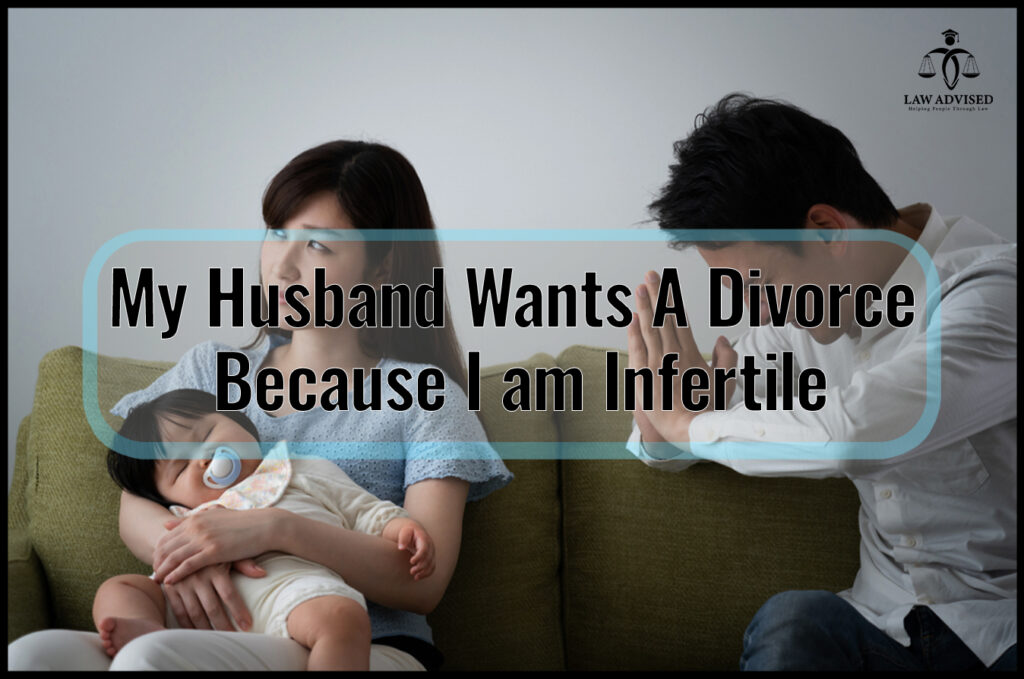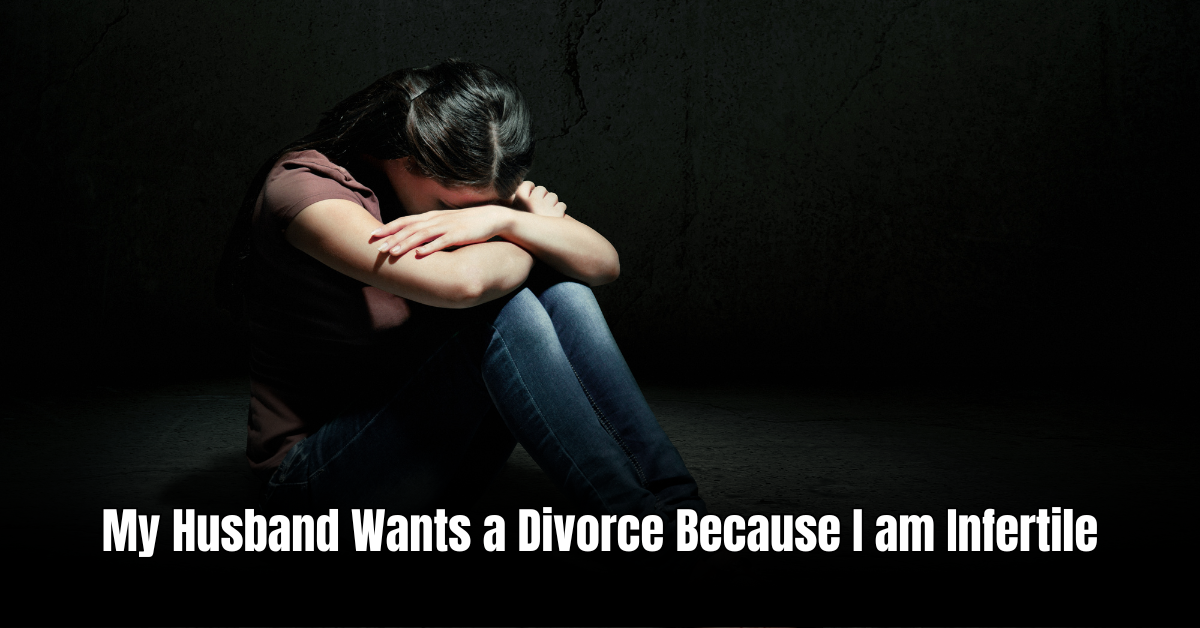My husband wants a divorce because I am infertile, causing strain in our relationship. Infertility can be a challenging issue that impacts not only a woman’s physical and emotional well-being but also her marriage.
Unfortunately, for some couples, the inability to conceive a child can lead to marital discord and even divorce. We will explore the sensitive topic of a husband wanting a divorce due to his wife’s infertility. While this may seem heart-wrenching, it is crucial to understand the complexities and emotions surrounding this difficult situation.
We will delve into the possible reasons behind such a decision, the potential impact on the relationship, and explore avenues for support and communication to navigate this difficult time. Emphasizing empathy and understanding, this article aims to shed light on the challenges faced by couples dealing with infertility and the impact it can have on their marriage.
Understanding The Emotions
Coming to terms with the news that your husband wants a divorce because of your infertility is an incredibly challenging and emotional experience. Coping with the Shock and Sadness that accompany this revelation is the first step towards healing. Give yourself time to process the news and allow yourself to grieve the loss of the future you had imagined.
It is normal to feel a range of emotions, including guilt and shame. Understand that infertility is not your fault, and these reactions are natural. Navigating Feelings of Guilt and Shame requires self-compassion and patience. Seek support from therapists or support groups to help you work through these complex emotions.
Another common emotion to deal with is anger and resentment. It’s important to acknowledge these feelings and find healthy ways to express them, such as through journaling or talking with a trusted friend. Letting go of these negative emotions will prevent further damage to your emotional well-being.
Remember, the journey of healing from divorce and infertility takes time. Reach out for emotional support and seek professional help if needed. You are not alone in this experience, and with time, you will find the strength to move forward.
Seeking Support And Guidance
Dealing with the news of your husband wanting a divorce due to infertility can be an emotional and overwhelming experience. It is crucial to find support and guidance during this difficult time.
One way to seek support is by opening up to your friends and family. Sharing your feelings with loved ones can provide a sense of relief and help you feel more understood. Their empathy and advice can offer you comfort and different perspectives on your situation.
Another source of support can be found in support groups. Connecting with others who have experienced similar challenges can be invaluable. Participating in these groups allows you to share your feelings, gain insights, and receive encouragement from those who truly understand what you’re going through.
Additionally, seeking professional counseling can provide you with the guidance needed to navigate the complexities of your emotions. A trained therapist can help you process your feelings, develop coping strategies, and explore ways to move forward.
| Support Strategies: |
|---|
| Open up to friends and family |
| Join support groups |
| Seek professional counseling |
Rediscovering Yourself
If you find yourself in a situation where your husband wants a divorce because you are infertile, it is important to focus on rediscovering yourself. This can be a challenging time, but it can also be an opportunity for personal growth and self-discovery. One way to do this is by exploring new hobbies and interests. Engaging in activities that bring you joy and fulfillment can help you find a sense of purpose and happiness outside of your relationship.
Another important aspect of rediscovering yourself is focusing on self-care and well-being. Taking care of your physical, emotional, and mental health is essential during this time. Prioritize activities that promote relaxation, such as yoga or meditation, and make sure to surround yourself with supportive and understanding people who can provide you with the love and encouragement you need. Finally, setting personal goals and aspirations can help you regain a sense of direction and purpose. Whether it’s starting a new career or pursuing a lifelong passion, setting goals can give you something to strive for and help you move forward with confidence. Remember, this is a time for self-discovery and growth, and while it may be challenging, it can also be an opportunity for a new beginning.

Building A Strong Support Network
Building a Strong Support Network
Cultivating Healthy Relationships:
- Surrounding Yourself with Positive Influences:
When facing the emotional challenges of infertility and dealing with a husband who wants a divorce, having a strong support network is crucial. Surrounding yourself with positive influences can help you navigate through this difficult time. Seek out friends and family members who are empathetic, understanding, and supportive. Share your feelings with them, and lean on them for emotional support.
- Creating Boundaries to Protect Your Emotional Health:
It is important to set boundaries to protect your emotional well-being. Boundaries can help you establish clear expectations for how others should treat you during this trying time. Communicate your boundaries assertively but respectfully, and don’t be afraid to say “no” when you need to. This will help you create a safe space for yourself and reduce the likelihood of being overwhelmed by negative emotions.
Remember, building a strong support network and cultivating healthy relationships is essential when dealing with infertility and a potential divorce. Surround yourself with positivity and create boundaries to protect your emotional health.
Letting Go And Forgiving
Understanding the Importance of Forgiveness
Facing the painful truth that your husband wants a divorce due to your infertility can be overwhelming. It is crucial, however, to recognize the significance of forgiveness in this difficult situation. Letting go of bitterness and resentment is not an easy task, but it is essential for your own emotional well-being.
Finding Inner Peace and Acceptance
Allow yourself the time and space to process your feelings. Acknowledge your pain and permit yourself to grieve. Understand that forgiveness does not mean ignoring or condoning any hurtful actions, but rather, it is a way to release yourself from the negative emotions that can consume your life.
Work towards healing and finding inner peace. Seek support from loved ones or consider therapy to help you navigate through this challenging time. Embrace the journey of self-discovery and focus on personal growth. Acceptance is an empowering step towards healing and rebuilding your life.
Moving Forward: Exploring Alternative Paths
Considering Adoption and Foster Care: When facing infertility and the possibility of a divorce, considering adoption and foster care can provide a new perspective. Adoption allows for the opportunity to provide a loving home to a child in need. It creates a lifelong bond and can bring immense joy and fulfillment. Similarly, foster care provides a temporary or long-term home to children who cannot safely remain with their birth families. It encompasses the chance to make a positive impact on a child’s life while also gaining a deeper understanding of their needs. By researching and consulting with adoption agencies or foster care organizations, couples can gain valuable insights into the process and requirements involved.
Embracing a Childfree Lifestyle: Another alternative to explore is embracing a childfree lifestyle. This decision allows couples to focus on nurturing their own relationship and pursuing personal dreams and ambitions. It provides the freedom to travel, invest in careers, and cultivate other meaningful relationships. It’s important to remember that being child-free doesn’t define a person’s worth or happiness. Society’s expectations should not dictate one’s life choices. Making peace with a child’s future can involve seeking support from friends, family, or professional resources to embrace and find fulfillment in this path truly.
Exploring Assisted Reproductive Technologies: For those who still desire to have a biological child, assisted reproductive technologies offer a glimmer of hope. Options like in vitro fertilization (IVF), intrauterine insemination (IUI), or third-party reproduction methods such as donor eggs or sperm can help couples overcome infertility challenges. It is crucial to consult with fertility specialists who can guide and provide appropriate solutions based on individual circumstances. Although these technologies present financial and emotional challenges, their success stories give hope to couples longing for a biological connection with a child.
Regardless of the path chosen, couples need to communicate openly, seek support, and make decisions that align with their values and dreams. Life has unexpected twists, but exploring alternative paths can lead to newfound happiness and fulfillment.
Embracing A New Future
Taking Steps towards Financial Independence:
Dealing with a divorce can be challenging, especially when it stems from infertility. However, this difficult situation can also serve as an opportunity for personal growth and a fresh start. One crucial aspect to consider is career growth and development. Focusing on enhancing your skills, updating your resume, and exploring new job opportunities can lead to a more fulfilling professional life.
Another important aspect is gaining financial independence. Taking charge of your finances, creating a budget, and considering alternative income streams can help you rebuild your life with greater stability.
Aside from focusing on career and finances, it is also crucial to prioritize finding love and happiness again. Engaging in self-care activities, seeking support from loved ones, and exploring new hobbies can assist in healing and rediscovering joy.
Frequently Asked Questions About My Husband Wants A Divorce Because I Am Infertile
Can Infertility Lead To Divorce?
Infertility may put a strain on a marriage, but it doesn’t always lead to divorce. Communication and support are key.
How Can Infertility Affect A Relationship?
Infertility can cause emotional distress, strain on intimacy, and communication breakdown if not addressed effectively.
What Can I Do If My Partner Wants A Divorce Because Of Infertility?
Seeking couples therapy or counseling can provide a safe space to address fears and find solutions together.
Is Infertility Solely The Woman’s Fault?
Factors in both partners can cause infertility, so it’s important not to assign blame.
Can Adoption Be A Solution To Save The Marriage?
Adoption can be a beautiful solution, but it should be an informed decision made by both partners wholeheartedly.
Should I Blame Myself For My Infertility?
Infertility is a medical condition, and blaming yourself only adds to the emotional burden. Seek support and understanding.
How Can I Cope With The Emotional Pain Of Infertility?
Finding support groups, seeking therapy, and practicing self-care can help you navigate the emotional challenges of infertility.
What Steps Can I Take To Strengthen My Relationship During Infertility?
Open and honest communication, seeking professional help, and finding ways to support each other can strengthen your bond during this difficult time.
Conclusion
Facing infertility can be an incredibly challenging situation, particularly if it leads to marital issues. It’s important to remember that no one is to blame for infertility, and it does not define your worth. Seek support from loved ones or a professional counselor to navigate these difficult emotions and decisions, ultimately finding the best path forward for your well-being and happiness.
Remember, there is hope and healing beyond this hardship.
Ismail Hossain is the founder of Law Advised. He is an Divorce, Separation, marriage lawyer. Follow him.





Leave a Reply